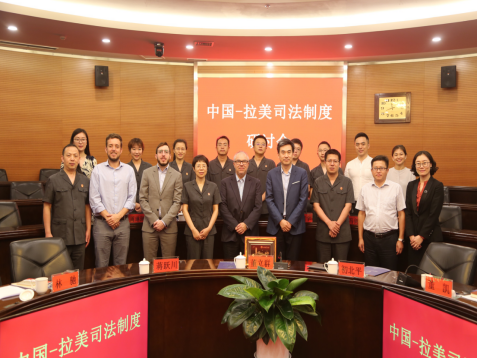In order to promote the understanding of the criminal and civil justice system of the countries along the "Belt & Road", on the morning of July 12th, Professor Chu Beiping, Dean of the Law School of Dalian Maritime University, Professor Jaime Arellano, executive chairman of the American Judicial Research Center, and other seven scholars visited the Dalian Intermediate People's Court. A seminar on "China-Latin American judicial system" was jointly held by the Intermediate Court and DMU Law. Experts from Chile, Argentina and Spain participated in the seminar.
The seminar was divided into three parts: the construction of intelligent courts, the observation of court trials and the discussion of academic theories.
Artificial intelligence helps litigation procedure innovation. In the process of understanding the achievements of the Intermediate Court on the construction of intelligent courts, legal experts from Argentina, Chile and Spain visited the litigation service center of the Court, and fully felt the changes brought about by the artificial intelligence cloud service to the litigation system-the convenience of public litigation, the simplification of judicial procedures and the privacy of case materials. The intelligent design of litigation procedure in the Dalian Intermediate People's Court shows the role of science and technology in promoting judicial reform.

(Vice President Ms. Dong Liqun of the Dalian Intermediate People's Court accompanied Latin American legal experts to visit the achievements of the construction of intelligent courts)
Single case reflects multiple analysis perspectives. In the process of observing the trial, scholars and judges jointly watched the video of the trial, and analyzed the case from different perspectives of theory and practice. It has been agreed that based on the theory of the constitution of crime, there is still room for discussion between the determination of intentional injury and negligent death. After the constitutive elements of formal crime are satisfied, we should still examine the substantive evaluation elements of crime and consider the social effect of conviction and sentencing.

(Seminar site)
The integration of basic theory and judicial practice. In the course of academic and theoretical discussions, judges from the Court, combined with China's judicial system, gave detailed answers to the questions raised by Latin American legal experts on litigation procedures, the role of judges, the similarities and differences between public prosecution and private prosecution cases, and case diversion mediation. Prof. Jiang Yuechuan, vice Dean of the Law School of Dalian Maritime University, and experts and scholars in the field of criminal and civil affairs have made supplementary explanations on the roles of judges and prosecutors in criminal proceedings, civil proceedings and arrest cases.

(Group photo of Chinese and foreign legal experts attending the seminar)
Through this seminar, the interactive dialogue between China and Latin American countries on procedural law theory has been realized, and under the background of "one belt and one road", a good theoretical and practical foundation has been laid for the mutual recognition, mutual promotion and common development of the legal system between China and Latin American countries.The smooth holding of this seminar has been strongly supported by the Dalian Intermediate People's Court, and we look forward to more in-depth exchanges and cooperation between the Law School of Dalian Maritime University and the Municipal Intermediate People's Court in the future.

(The Dean of DMU Law School Prof. Chu presents souvenirs to Ms. Dong Liqun, vice president of the Intermediate Court)